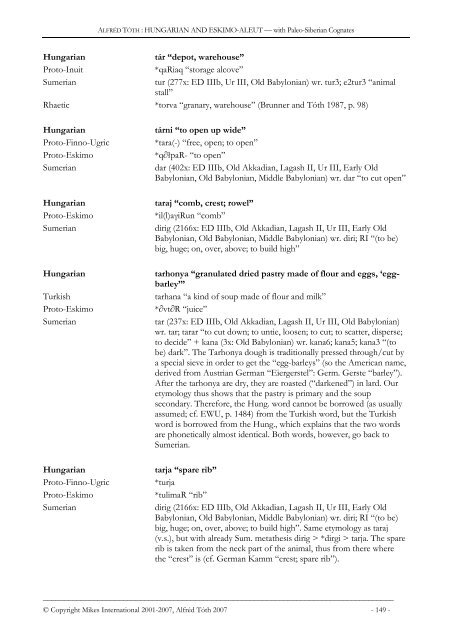Hungarian and Eskimo-Aleut
Hungarian and Eskimo-Aleut
Hungarian and Eskimo-Aleut
Create successful ePaper yourself
Turn your PDF publications into a flip-book with our unique Google optimized e-Paper software.
ALFRÉD TÓTH : HUNGARIAN AND ESKIMO-ALEUT — with Paleo-Siberian Cognates<br />
<strong>Hungarian</strong> tár “depot, warehouse”<br />
Proto-Inuit *qaRiaq “storage alcove”<br />
Sumerian tur (277x: ED IIIb, Ur III, Old Babylonian) wr. tur3; e2tur3 “animal<br />
stall”<br />
Rhaetic *torva “granary, warehouse” (Brunner <strong>and</strong> Tóth 1987, p. 98)<br />
<strong>Hungarian</strong> tárni “to open up wide”<br />
Proto-Finno-Ugric *tara(-) “free, open; to open”<br />
Proto-<strong>Eskimo</strong> *q∂łpaR- “to open”<br />
Sumerian dar (402x: ED IIIb, Old Akkadian, Lagash II, Ur III, Early Old<br />
Babylonian, Old Babylonian, Middle Babylonian) wr. dar “to cut open”<br />
<strong>Hungarian</strong> taraj “comb, crest; rowel”<br />
Proto-<strong>Eskimo</strong> *il(l)aγiRun “comb”<br />
Sumerian dirig (2166x: ED IIIb, Old Akkadian, Lagash II, Ur III, Early Old<br />
Babylonian, Old Babylonian, Middle Babylonian) wr. diri; RI “(to be)<br />
big, huge; on, over, above; to build high”<br />
<strong>Hungarian</strong> tarhonya “granulated dried pastry made of flour <strong>and</strong> eggs, ‘eggbarley’”<br />
Turkish tarhana “a kind of soup made of flour <strong>and</strong> milk”<br />
Proto-<strong>Eskimo</strong> *∂vt∂R “juice”<br />
Sumerian tar (237x: ED IIIb, Old Akkadian, Lagash II, Ur III, Old Babylonian)<br />
wr. tar; tarar “to cut down; to untie, loosen; to cut; to scatter, disperse;<br />
to decide” + kana (3x: Old Babylonian) wr. kana6; kana5; kana3 “(to<br />
be) dark”. The Tarhonya dough is traditionally pressed through/cut by<br />
a special sieve in order to get the “egg-barleys” (so the American name,<br />
derived from Austrian German “Eiergerstel”: Germ. Gerste “barley”).<br />
After the tarhonya are dry, they are roasted (“darkened”) in lard. Our<br />
etymology thus shows that the pastry is primary <strong>and</strong> the soup<br />
secondary. Therefore, the Hung. word cannot be borrowed (as usually<br />
assumed; cf. EWU, p. 1484) from the Turkish word, but the Turkish<br />
word is borrowed from the Hung., which explains that the two words<br />
are phonetically almost identical. Both words, however, go back to<br />
Sumerian.<br />
<strong>Hungarian</strong> tarja “spare rib”<br />
Proto-Finno-Ugric *turja<br />
Proto-<strong>Eskimo</strong> *tulimaR “rib”<br />
Sumerian dirig (2166x: ED IIIb, Old Akkadian, Lagash II, Ur III, Early Old<br />
Babylonian, Old Babylonian, Middle Babylonian) wr. diri; RI “(to be)<br />
big, huge; on, over, above; to build high”. Same etymology as taraj<br />
(v.s.), but with already Sum. metathesis dirig > *dirgi > tarja. The spare<br />
rib is taken from the neck part of the animal, thus from there where<br />
the “crest” is (cf. German Kamm “crest; spare rib”).<br />
___________________________________________________________________________________<br />
© Copyright Mikes International 2001-2007, Alfréd Tóth 2007 - 149 -

















